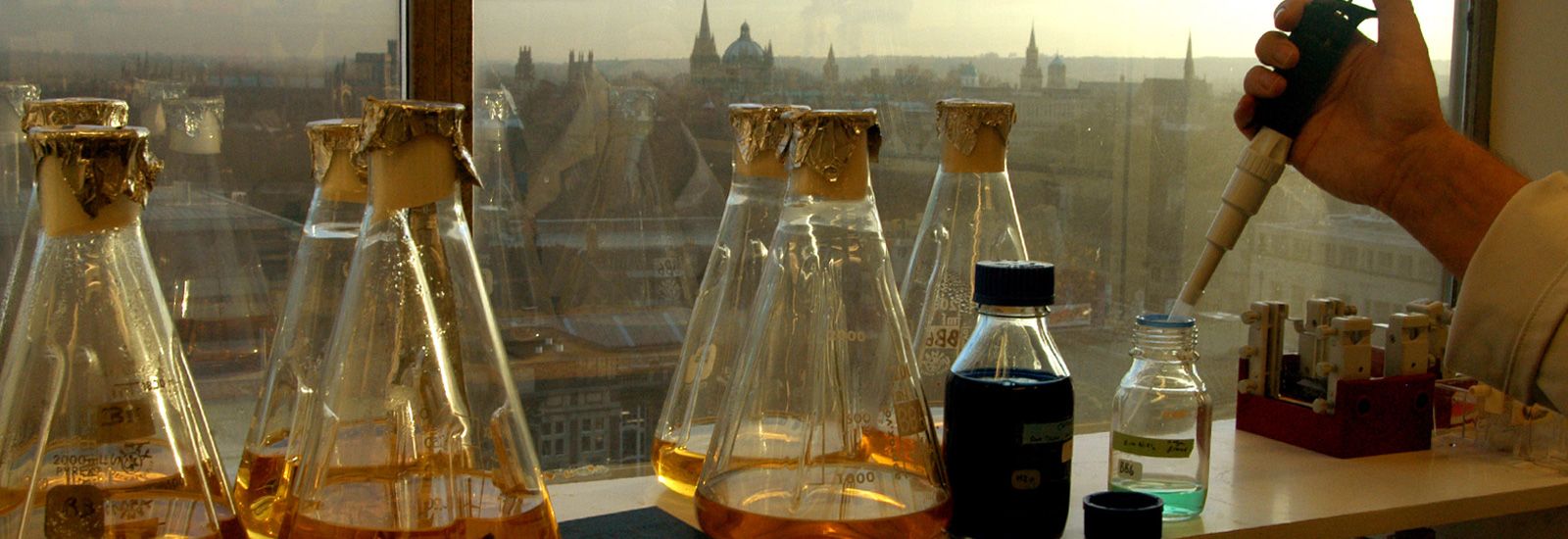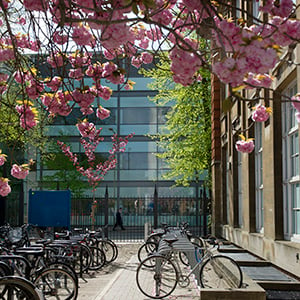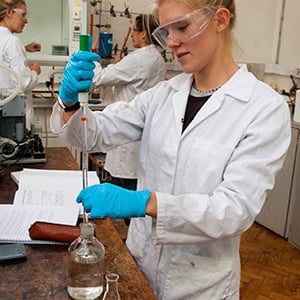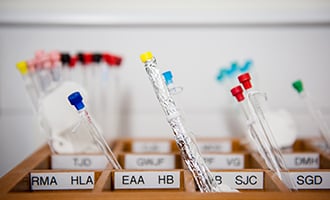
Chemistry
Course overview
UCAS code: F100
Entrance requirements: A*A*A (with both A*s in science or maths subjects)
Course duration: 4 years (MChem)
Subject requirements
Required subjects: Chemistry and Maths
Recommended subjects: Another science or Further Maths
Helpful subjects: Not applicable
Other course requirements
Admissions tests: None
Written Work: None
Admissions statistics*
Interviewed: 66%
Successful: 18%
Intake: 180
*3-year average 2022-24
Contact
Tel: +44 (0) 1865 272568
Email: [email protected]
Unistats information for this course can be found at the bottom of the page
Please note that there may be no data available if the number of course participants is very small.
About the course
Chemistry is a wide-ranging science concerned with matter at the atomic and molecular scale. Important aspects are:
- synthesis
- structure
- reaction mechanisms
- properties
- analysis
- and transformations of all types of materials.
Chemists are a constant source of innovation: it is hard to imagine any product introduced in recent times that did not require the creative efforts of a chemist.
Chemistry underpins the conceptual framework and methodology of biochemistry and molecular medicine and is at the heart of many major industries.
Teaching and research are closely linked on the course: Oxford has one of the leading chemistry departments in the world with state-of-the-art teaching and research laboratories and world-class research in a broad range of areas including:
- synthesis and catalysis
- medicinal and biological chemistry
- sustainable energy
- advanced materials
- innovative measurement
- theoretical and computational chemistry.
Students will be taught an exciting practical course in our recently-built lab. The department has an outstanding track record in commercialising the innovative work of research staff, which has raised millions of pounds for the University.
The MChem is a four-year course and is not modular, in the sense that the subject is taught and examined as a whole, enabling us to explore the links within the subject.
The core material is taken by all students, with opportunities to specialise later in the course.
The fourth year (Part II) is devoted exclusively to research – a distinctive feature of Chemistry at Oxford since 1916.
To hear more about Chemistry at Oxford, visit our video: Chemistry at Oxford.
To hear more about our undergraduate Teaching Labs, visit our video: Chemistry Teaching Laboratory.
Work placements/international opportunities
The fourth year (Part II) of the course involves full-time work within an established research group, which offers the possibility for a few students to spend time at laboratories in industry or at universities abroad.
Many students find work placements during vacations through the Careers Service and there are some opportunities within the department.
 |  |  |
'We study organic, inorganic and physical chemistry as well as maths. The topics we study range from quantum mechanics, to the applications of superconductors, to biochemical warfare and drug targets. The department is one of the best in the world, with many top research chemists. It’s amazing how often we have lectures or tutorials given by the authors of the textbooks we use!' Abigail | 'The great thing about Chemistry is that you learn about the fundamental aspects of the world we live in. Some of the biggest problems that face humanity are solved – via medicine, or via social and economic improvements – by the discoveries made by chemists.' Jack | 'The best things [were often] the other students - when I joined the committee of the Scientific Society, I wasn't sure that I would ever know as much as the older students about the scientific community across all fields in the UK. Over the past two years, I've been able to meet and talk at length with some of the best-known scientists in the UK and beyond, including invaluable contacts in my own field who I've kept in contact with ever since.' Nessa |
To hear more from past and current MChem students, visit our video: Our students’ thoughts.
Astrophoria Foundation Year
If you’re interested in studying Chemistry but your personal or educational circumstances have meant you are unlikely to achieve the grades typically required for Oxford courses, then Chemistry with a Foundation Year might be right for you.
Visit our Foundation Year course pages for more details.
Unistats information
Discover Uni course data provides applicants with Unistats statistics about undergraduate life at Oxford for a particular undergraduate course.
Please select 'see course data' to view the full Unistats data for Chemistry.
Please note that there may be no data available if the number of course participants is very small.
Visit the Studying at Oxford section of this page for a more general insight into what studying here is likely to be like.
Chemistry
A typical week (Years 1–3)
- Ten lectures (9am to 11am)
- One or two tutorials in your college with set work to be completed in your own time
- Two afternoons of laboratory work (11am to 5pm)
- A problems class, eg a mathematics class in the first year.
Tutorials are usually 2-4 students with a tutor. Class sizes may vary but would usually be no more than around 15 students and can be as small as four.
Most tutorials, classes, and lectures are delivered by academic staff who are members of the department. Many are world-leading experts with years of experience in teaching and research.
Some teaching may also be delivered by postgraduate students who are usually studying at doctorate level.
Part II (Year 4)
Part II (the fourth year) involves full-time work with an established research group. Devoting the fourth year exclusively to research has been a distinctive feature of Chemistry at Oxford since 1916 and this will give you research skills that are highly valued by both academics and employers.
This final research year of the Chemistry course has three extended terms of 12 to 13 weeks (instead of the normal eight weeks) and is 38 weeks in total.
To hear more about how our undergraduate course works, visit our video: The Oxford MChem course.
To find out more about how our teaching year is structured, visit our Academic Year page.
Course structure
Year 1
Courses | Assessment |
|---|---|
The first year of the course covers the traditional areas of Inorganic, Organic and Physical Chemistry, together with Mathematics for Chemistry. These are broadly based, and include topics such as Biological Chemistry and Physics, which are presented in a chemical context.
| Preliminary examination: four written papers; practical work. |
Year 2
Courses | Assessment |
|---|---|
During the second year of the course, students build up their understanding of the subject and cover most of the core material in the degree. Examples of some of the topics included are:
| Part IA examinations: three written papers; continuous assessment of practical work. |
Year 3
Courses | Assessment |
|---|---|
The third year begins by completing the core material, followed by a wide variety of options courses, some of which relate to research interests in the department. Students are taught through practical work, lectures and small group classes and tutorials. | Part IB examinations: seven written papers; continuous assessment of practical work. |
Year 4 (extended terms)
Research | Assessment |
|---|---|
The fourth year is spent exclusively on research, providing students with the opportunity to immerse themselves in a significant project in one of the world’s premier research departments. Students are supervised by a member of academic staff and have full access to the research facilities of their host laboratory. | Part II examination: thesis; oral examination. The final degree classification is determined at the end of the fourth year. |
This course is currently under review. Up-to-date details on any course changes can be found on the Chemistry website.
The content and format of this course may change in some circumstances. Read further information about potential course changes.
Academic requirements
A-levels: | A*A*A (including Chemistry and Mathematics) with both A*s in science or maths subjects. Read the full list of subjects in which an A* grade will be acceptable. |
|---|---|
Advanced Highers: | AA/AAB (including Chemistry and Mathematics) |
International Baccalaureate (IB): | 40 (including core points). For applicants offering HL Mathematics 766 at HL with 7 in HL Chemistry and 6 in HL Mathematics. For applicants offering SL Mathematics: 776 at HL with 7 in both HL Chemistry and a second HL science subject, and 7 in SL Mathematics: Analysis and Approaches. |
Any other equivalent qualification | View information on other UK qualifications, and international qualifications. |
Wherever possible, your grades are considered in the context in which they have been achieved.
Read further information on how we use contextual data.
Subject requirements
Essential: | Candidates are required to have Chemistry and Mathematics to A-level, Advanced Higher, or Higher Level in the IB or any other equivalent. In IB, Mathematics 7 at SL is also acceptable only where students have taken Analysis & Approaches. |
|---|---|
Recommended: | An additional science subject or Further Mathematics is strongly recommended. |
If a practical component forms part of any of your science A‐levels used to meet your offer, we expect you to pass it.
If English is not your first language you may also need to meet our English language requirements.
If your personal or educational circumstances have meant you are unlikely to achieve the grades listed above for undergraduate study, but you still have a strong interest in the subject, then applying for Chemistry with a Foundation Year might be right for you.
Visit the course pages for more details of academic requirements and eligibility.
Applying
All candidates must follow the application procedure as shown on our Applying to Oxford pages.
The following information gives specific details for students applying for this course.
Admissions test
You do not need to take an admissions test as part of an application for this course.
Written work
You do not need to submit any written work when you apply for this course.
What are tutors looking for?
Tutors are looking for evidence of academic excellence and motivation, as well as the potential for advanced study, a capacity to analyse, explain and apply current knowledge, and a readiness to have a go at problems even when you cannot see how.
Visit the Chemistry website for more detail on the selection criteria for this course.
To hear more about the admission process, view our video: Oxford Chemistry admissions.
Careers
Chemistry is the basis of some of the most economically important industries in the UK, and these companies require a supply of high-quality graduate chemists. Almost all of our graduates gain immediate employment or continue to postgraduate study.
Chemistry provides an excellent opportunity for the development of your critical faculties, and also instils important transferable skills that will serve you well, whatever your subsequent choice of career.
While about 55% of our Chemistry graduates go on to do research or further study, others enter professions such as scientific journalism, consultancy, patent law and teaching.
Long term, more than half our graduates remain in posts related to chemistry in some way.
The University Careers Service provides a wide range of support for students whilst on course, and also after graduating. The Royal Society of Chemistry provides further information about careers using chemistry.
We don't want anyone who has the academic ability to get a place to study here to be held back by their financial circumstances. To meet that aim, Oxford offers one of the most generous financial support packages available for UK students and this may be supplemented by support from your college.
Fees
Please note that for full-time Home undergraduate students, current university policy is to charge fees at the level of the cap set by the government, which for 2026/27 is £9,790. For details of annual increases, please see our guidance on likely increases to fees and charges. In the 2027/28 academic year course fees for Home fee status students will rise to £10,050 (in line with the government fee cap).
For more information please refer to our course fees page. Fees will usually increase annually. For details, please see our guidance on likely increases to fees and charges.
Living costs
Living costs at Oxford might be less than you’d expect, as our world-class resources and college provision can help keep costs down.
Living costs for the academic year starting in 2026 are estimated to be between £1,405 and £2,105 for each month you are in Oxford. Our academic year is made up of three eight-week terms, so you would not usually need to be in Oxford for much more than six months of the year but may wish to budget over a nine-month period to ensure you also have sufficient funds during the holidays to meet essential costs. For further details please visit our living costs webpage.
Financial support
Home | A tuition fee loan is available from the UK government to cover course fees in full for Home (UK, Irish nationals and other eligible students with UK citizens' rights - see below*) students undertaking their first undergraduate degree**, so you don’t need to pay your course fees up front. In 2026 Oxford is offering one of the most generous bursary packages of any UK university to Home students with a family income of around £50,000 or less, with additional opportunities available to UK students from households with incomes of £32,500 or less. The UK government also provides living costs support to Home students from the UK and those with settled status who meet the residence requirements. *For courses starting on or after 1 August 2021, the UK government has confirmed that EU, other EEA, and Swiss Nationals will be eligible for student finance from the UK government if they have UK citizens’ rights (i.e. if they have pre-settled or settled status, or if they are an Irish citizen covered by the Common Travel Area arrangement). The support you can access from the government will depend on your residency status. |
Islands | Islands students are entitled to different support to that of students from the rest of the UK. Please refer the links below for information on the support to you available from your funding agency: |
Overseas | Please refer to the "Other Scholarships" section of our Oxford Bursaries and Scholarships page. |
**If you have studied at undergraduate level before and completed your course, you will be classed as an Equivalent or Lower Qualification student (ELQ) and won’t be eligible to receive government or Oxford funding
Additional Fees and Charges Information for Chemistry
Students in their fourth year undertake full-time research under the supervision of a member of the academic staff. This final year has three extended terms of 12 to 13 weeks and is 38 weeks in total, so you will need to budget for higher living costs in the final year, as you will be required to be in Oxford for longer than the standard terms. (View the likely range of living costs for an additional month in Oxford.) This final year, which is entirely devoted to research, is a unique feature of the Oxford course, and will give you research skills that are highly valued by both academics and employers.
Contextual information
Unistats course data from Discover Uni provides applicants with statistics about a particular undergraduate course at Oxford. For a more holistic insight into what studying here is likely to be like, please view the information below and explore our website more widely.
The Oxford tutorial
College tutorials are central to teaching at Oxford. Typically, they take place in your college and are led by your academic tutor(s) who teach as well as do their own research. Students will also receive teaching in a variety of other ways, depending on the course. This will include lectures and classes, and may include laboratory work and fieldwork. However, tutorials offer a level of personalised attention from academic experts unavailable at most universities.
During tutorials (normally lasting an hour), college subject tutors will give you and one or two tutorial partners feedback on prepared work and cover a topic in depth. The other student(s) in your tutorials will typically be doing the same course as you and covering the same topic. Such regular and rigorous academic discussion develops and facilitates learning in a way that isn’t possible through lectures alone. Tutorials also allow for close progress monitoring so tutors can quickly provide additional support if necessary.
Read more about tutorials and an Oxford education
College life
Our colleges are at the heart of Oxford’s reputation as one of the best universities in the world.
- At Oxford, everyone is a member of a college as well as their subject department(s) and the University. Students therefore have both the benefits of belonging to a large, renowned institution and to a small and friendly academic community. Each college or hall is made up of academic and support staff, and students. Colleges provide a safe, supportive environment leaving you free to focus on your studies, enjoy time with friends and make the most of the huge variety of opportunities.
- Each college has a unique character, but generally their facilities are similar. Each one, large or small, will have the following essential facilities:
- Porters’ lodge (a staffed entrance and reception)
- Dining hall
- Lending library (often open 24/7 in term time)
- Student accommodation
- Tutors’ teaching rooms
- Chapel and/or music rooms
- Laundry
- Green spaces
- Common room (known as the JCR).
- All first-year students are offered college accommodation either on the main site of their college or in a nearby college annexe. This means that your neighbours will also be ‘freshers’ and new to life at Oxford. This accommodation is guaranteed, so you don’t need to worry about finding somewhere to live after accepting a place here, all of this is organised for you before you arrive.
- All colleges offer at least one further year of accommodation and some offer it for the entire duration of your degree. You may choose to take up the option to live in your college for the whole of your time at Oxford, or you might decide to arrange your own accommodation after your first year – perhaps because you want to live with friends from other colleges.
- While college academic tutors primarily support your academic development, you can also ask their advice on other things. Lots of other college staff including welfare officers help students settle in and are available to offer guidance on practical or health matters. Current students also actively support students in earlier years, sometimes as part of a college ‘family’ or as peer supporters trained by the University’s Counselling Service.
Connect with us
Outreach programmes and events
The Department of Chemistry runs dedicated outreach programmes, events and activities aimed at promoting science and chemistry and supporting talented students from all backgrounds to apply to the course.
Programmes and subject-specific resources
The Department of Chemistry aims to inspire young people to aspire to study the chemical sciences beyond school and to support them to attain this goal.
UK state school students interested in chemistry can apply to UNIQ, Oxford’s flagship outreach programme for students in their first year of further education. Each year, UNIQ provides over 1,500 students with the opportunity to experience Oxford teaching and receive application support.
Anyone interested in studying Chemistry at Oxford is encouraged to explore details of subject-specific opportunities and resources on the Department of Chemistry website. Please note that some outreach events may require advance booking or have specific eligibility criteria.
Department contact details
![]() +44 (0) 1865 281510
+44 (0) 1865 281510 ![]() [email protected]
[email protected] ![]() chem.web.ox.ac.uk/schools
chem.web.ox.ac.uk/schools
University-wide events and resources
In addition to exploring department-run activities, we recommend checking out the outreach event calendar for upcoming University-wide events and other subject and college activities.
Subject-specific resources supporting supercurricular engagement for all ages can also be found via the University's Digital Resource Hub, suggested subject resources webpage and Oxplore, our online learning platform for 11-to-18-year-olds.
Prospective applicants can sign up to receive step-by-step support with their Oxford application.
Read more about Oxford's widening access initiatives and other ways to connect with us before applying.

